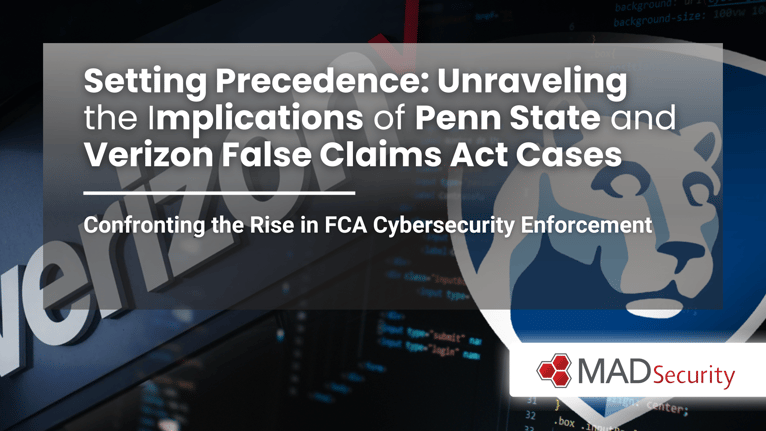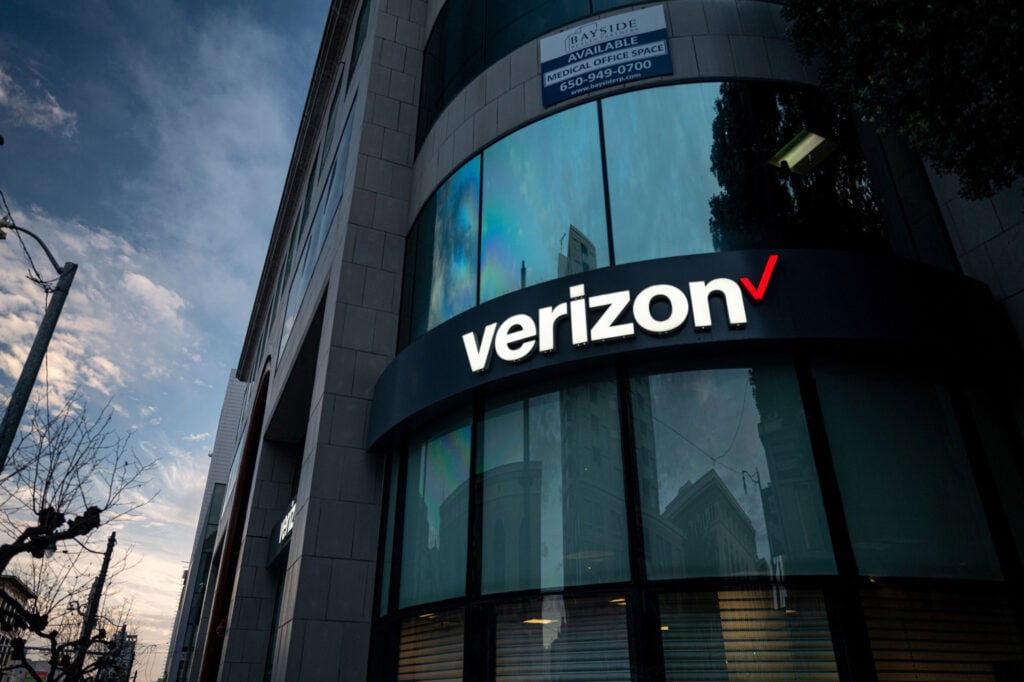
Introduction
Maintaining high cybersecurity standards has never been more crucial as a government contractor. The recent lawsuits involving Penn State University and Verizon have not only drawn attention to the grave implications of cybersecurity lapses but have also set significant precedents in cybersecurity enforcement and compliance. In this article, we at MAD Security delve deeper into these cases, elucidating the potential repercussions and the imperative need for robust cybersecurity frameworks to navigate the intricate world of cybersecurity compliance successfully.
The Paradigm of Cybersecurity Compliance
The spotlight on cybersecurity compliance has intensified, with an uptick in False Claims Act (FCA) activity signaling a renewed focus on enforcing robust security measures. A heightened commitment to cybersecurity is no longer optional but a requisite in maintaining organizational integrity and consumer trust. Ensuring cybersecurity is at the forefront of compliance efforts is paramount in mitigating risks associated with FCA allegations.

Penn State University Lawsuit: A Synopsis
On September 1, 2023, a qui tam FCA lawsuit was unsealed against Penn State University, highlighting the potential vulnerabilities even educational institutions face regarding cybersecurity compliance. The lawsuit alleges that the university failed to meet the stringent cybersecurity standards required for handling Covered Defense Information (CDI) under the DFARS 252.204-7012 clause and is accused of falsifying over 20 documents related to compliance self-assessment. Astonishingly, Penn State has been claiming compliance since January 1, 2018, even though they never achieved full DFARS compliance, highlighting the crucial role of transparency, accountability, and diligence in cybersecurity practices.
Verizon DOJ Settlement:
Unpacking the Details
Another pivotal instance involves Verizon, which consented to a payment of over $4 million to settle accusations of lapses in cybersecurity protocols for its Managed Trusted Internet Protocol Service (MTIPS) per the settlement agreement. Despite the allegations, Verizon was commended for its proactive measures, including voluntary disclosure of the issue, launching an independent inquiry and compliance audit, and swift application of substantial corrective actions. This scenario emphasizes the significant role of robust compliance frameworks and the need for cultivating an environment fostering internal assessments, voluntary disclosures, comprehensive investigations, and collaboration with the government.

Significance & Precedence
The Penn State lawsuit is particularly noteworthy as it highlights the vulnerabilities and stringent responsibilities of DoD contractors and subcontractors in upholding cybersecurity compliance. It signifies the profound implications of non-compliance and sets a precedent for the level of transparency, accuracy, and responsibility required in cybersecurity attestations, emphasizing the critical nature of fostering a culture centered on transparency, accountability, and diligence.
The Verizon resolution accentuates the critical importance of adhering to precise cybersecurity protocols and the potential legal and financial ramifications of any lapses therein. It reinforces the necessity for a comprehensive and transparent approach to cybersecurity compliance. It sets precedence for the value of internal assessments, disclosures, and collaborative investigations with governmental bodies in mitigating risks and reinforcing commitment to cybersecurity standards.
Pivotal Lessons & Broader Implications
These cases not only stress the importance of understanding and strictly adhering to government-mandated cybersecurity standards but also spotlight the need for fostering a culture of transparency, accountability, and diligence within organizations. For DoD contractors, subcontractors, universities, and higher education institutions with government contracts, it is essential to realize that they are NOT IMMUNE from cyber-related FCA claims and must actively comprehend and adhere to government cybersecurity regulations.
Emphasizing Proactive Measures
Organizations must not only focus on robust policy implementation and continuous internal reviews to identify and address compliance gaps but also take internal complaints seriously. Engaging legal counsel or independent consultants for thorough investigations in line with actual compliance requirements is crucial. The cultivation of such practices contributes significantly to risk mitigation and demonstrates a steadfast dedication to upholding cybersecurity compliance.

MAD Security’s Standpoint
At MAD Security, we understand the intricacies and the paramount importance of adhering to established cybersecurity standards. We specialize in integrating the NIST framework and standards, providing tailored security solutions and services to successfully navigate the evolving landscape of cybersecurity enforcement. Our unparalleled expertise in DFARS, CMMC, and NIST ensures that organizations are well-equipped to bolster their cybersecurity postures and meet compliance requirements effectively and efficiently.
Conclusion
The cybersecurity landscape is continually evolving, with the incidences involving Penn State University and Verizon manifesting the profound consequences and the pressing need for fortified cybersecurity measures and uncompromised compliance. The significance of these cases is far-reaching, establishing new standards and reinforcing the principles of transparency, accountability, and proactivity in cybersecurity practices.
These instances signify a critical juncture in the discourse on cybersecurity compliance, with the precedents set bearing extensive implications for organizations across the spectrum. At MAD Security, we are steadfast in our mission to support organizations in navigating these complexities, utilizing our extensive experience and cutting-edge methodologies to safeguard digital assets against the multifaceted spectrum of cyber threats.
Original Published Date: November 14, 2023
By: MAD Security

